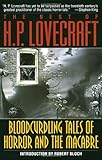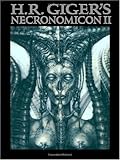Cthulhu Week: The Tentacles That Bind
Posted on August 19, 2010 by Eric Pollarine
Next up for Cthulhu Week is a little something from Flames Rising reviewer Eric Pollarine. Eric takes a look at some of his favorite fiction, music and movies and talks about how these folks have been influenced by H. P. Lovecraft and just what that means to him as a horror fan.
H. P. Lovecraft.
 The name alone sets the stage in your mind, if you are a fan of horror, or even if you are not – to a place in time that is alive with the nightmares of the industrial revolution and arcane secrets hiding in dusty old texts. A place of extraordinary psychological terror, a time in which we were a young nation, exploring the limits of our capacity to both destroy and create -the modern, and the profane; the forbidden knowledge of the Garden of Eden, the limits and expectations of Fate and above all else the limited resources of man faced with the fact that he is in and of himself the primary cause for both guilt and civilization’s current state.
The name alone sets the stage in your mind, if you are a fan of horror, or even if you are not – to a place in time that is alive with the nightmares of the industrial revolution and arcane secrets hiding in dusty old texts. A place of extraordinary psychological terror, a time in which we were a young nation, exploring the limits of our capacity to both destroy and create -the modern, and the profane; the forbidden knowledge of the Garden of Eden, the limits and expectations of Fate and above all else the limited resources of man faced with the fact that he is in and of himself the primary cause for both guilt and civilization’s current state.
There can be no doubt about the lasting influence of Lovecraft on the culture and creation of horror, fiction, literature, film and more. He is a formidable foe to all those who put fingers to keyboards or press pen to paper. Always there in the back of your mind, always lurking in the same recesses of the imagination as our darkest fears and aspirations. Hundreds of writers have imitated him, made offerings of their work to him, dedicated their lives to studying him and more and more generations of young and old alike discover the allure of Lovecraft’s body of terrifying work as the years spin by.
There’s so much to write about in such a small and limited space that it almost seems silly to attempt, but this isn’t about the attempt, dear readers, this is about the idea of influence and what Lovecraft has had to offer up to those we regard as being the titans of the industry-those who merely take the crown of the dead king. But there can and will always only be one Lovecraft. And to this writer turned pathetic and pallid opinion pusher-he would have it no other way. Not to say that those that are so influenced by him are sub-par, far from it, so the purpose of this article is not to put a wreath of laurels at the grave, no I have not come to praise our Caesar, nor have I come to bury him. I have come to shed a quiet light on how Lovecraft has come to shape the minds of those who command our attention today.
Because even though Lovecraft, in all his now immense legend, didn’t have the literary punch in his time that either Hemmingway or F. Scott Fitzgerald had, his contribution to our modern society is one of not only a lasting written tradition, but also encompasses the “New Media” as well. No, not the sphere of social networking, though I am surprised that no one has (and if they have someone point me to it) formulated a social networking site based on the Cthulhu Mythos, but the “New Media” of film, television, modern adult fiction, and even music.
Every one who is anyone in this industry of Horror seems to have been influenced by the man, the fact that so many people, notable authors like Stephen King, Robert E. Howard and Clive Barker call him a direct influence on their work seems obvious – especially in the case of Mr. Barker, who created his own universe/ Mythos which nearly rivals that of Lovecraft’s love of detail and complexity. But some of you might be surprised, as I know that I was, to find out that notable comics figure such as Neil Gaiman and Alan Moore. Upon further inspection, it seems Gaiman’s “Sandman” work, especially in light of the classic Lovecraftian themes of the non human influences on society, fate and most notably inherited guilt-which one could say that “Dream/Morpheus” is just that, a physical and living representation of all three in one, shows how deeply the master of so called “Modern” horror touches our lives with his thick tentacles even in the internet age. And with the case of Alan Moore, well, have you ever seen Alan Moore? Nothing surprises me any more with Alan Moore.
 But little did I really know, when I started out on this journey that Lovecraft wouldn’t stop there – He’s also influenced heavy hitters in the music scene, as well as a multitude of “Indie” bands alike. Take for instance the very obvious, though misspelled, reference to Lovecraft in Metallica’s “The Call of Ktulu” as well as the Black Sabbath song “Beyond the Wall of Sleep” which is obviously based on the short story of the exact same name. But it isn’t that bands themselves write songs in hail to the old god, it’s the fact that among artists like Danzig, whose “How the God’s Kill” album is adorned by H.R. Giger’s artwork, who has also credited Lovecraft as being a large influence on his artwork, shows that the multimedia reach of Lovecraft is an ever pervading tentacle in modern pop/alternative culture. There was even, a band, in the late 60’s who was called, literally, H. P. Lovecraft.
But little did I really know, when I started out on this journey that Lovecraft wouldn’t stop there – He’s also influenced heavy hitters in the music scene, as well as a multitude of “Indie” bands alike. Take for instance the very obvious, though misspelled, reference to Lovecraft in Metallica’s “The Call of Ktulu” as well as the Black Sabbath song “Beyond the Wall of Sleep” which is obviously based on the short story of the exact same name. But it isn’t that bands themselves write songs in hail to the old god, it’s the fact that among artists like Danzig, whose “How the God’s Kill” album is adorned by H.R. Giger’s artwork, who has also credited Lovecraft as being a large influence on his artwork, shows that the multimedia reach of Lovecraft is an ever pervading tentacle in modern pop/alternative culture. There was even, a band, in the late 60’s who was called, literally, H. P. Lovecraft.
But Lovecraft doesn’t just stop there – I mean I could write three articles, all of varying lengths on this subject with the amount of research that I have done since this week was announced. Because, I don’t like Lovecraft… there I said it; I find his stories bland, tedious and wholly un-frightening. His use of pace and dialogue is archaic and doesn’t hold well over time, his characters and monsters, in my opinion should be relegated to the penny pulp novels in which they were first printed. In a word I would say “Overrated.”
But at the same time, those authors and those creators and those producers, which are such a great influence on me, those names which I listed above, from Gaiman to Moore to Barker. From Danzig and Giger to the little known French stencil based street artists who use images of Cthulhu in their installations, if you don’t believe me then search it, it’s actually really awesome stuff. From the themes he worked in, dealing with race, ethnicity, class and possibly, the most important, civilization under threat, because after all I work with zombies. And as far from zombies as Lovecraft seems, as much as I personally don’t like the stories – I have to hang my head in respect and regard his work as groundbreaking, forward thinking and even influential. Because without Lovecraft, well, non of us would be here, writing what we write and reading what we read.
Eric Pollarine – 2010
Tags | cthulhu, cthulhu week, lovecraft

